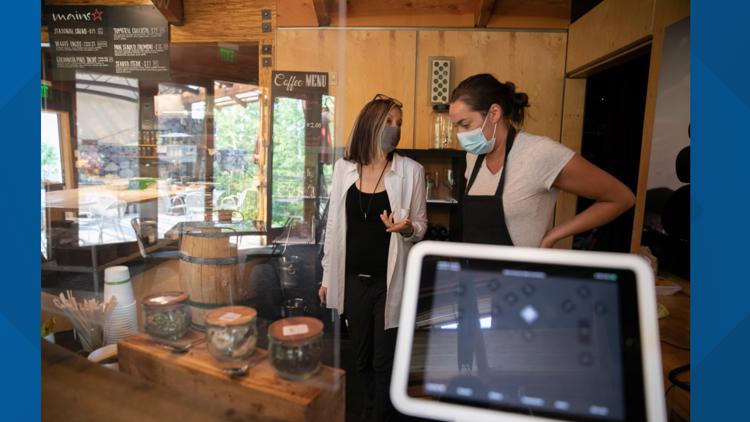CALIFORNIA, USA — This story was originally published by CalMatters.
Patty Baird hasn’t taken a single day off in the past year. Cedar House Sport Hotel, her boutique hotel in Truckee, is experiencing a surge of reservations. Even weekday evenings are getting booked up by the work-from-anywhere contingent. Baird is grateful for the additional business, but she’s struggled to hire more staff, which has left her working 12- to 16-hour days.
Difficulty hiring is just one of several issues Baird faces this summer as California’s economy reopens. The uptick in COVID-19 cases across the state caused by the more contagious delta variant has renewed her sense of uncertainty. She has stopped taking deposits for events because cancellations and refunds last year created gaping holes in her balance sheet. An air conditioning unit she ordered in May won’t arrive until August at the earliest. In the meantime, staff routinely spray an older unit with water to keep it from overheating. This year feels harder to manage than last year.
“It just feels more stressful, because of the unknowns,” Baird says. “Is something around the corner?”
California’s economy is no longer at its nadir. The state has regained slightly more than half of the 2.7 million jobs it lost in March and April 2020 when the pandemic shut down many businesses. Gov. Gavin Newsom, squeezed by the Sept. 14 recall election, touts the state’s economic gains bolstered by a massive budget surplus and an infusion of billions from federal stimulus programs. Yet it’s clear that the state’s economy is in a different place than it was before the pandemic.
No region of California — from Silicon Valley, to Hollywood, to the Central Valley — is back to pre-pandemic employment rates. And while some large companies raked in record profits over the past year and a half, small business owners say several factors — including the possibility of new restrictions, difficulty hiring staff and inadequate child care — make the coming months feel uncertain, which is preventing California from making a full comeback.
Positions going unfilled
According to the state, California employers added roughly 73,500 non-farm jobs in June. But total civilian employment increased by only 24,500. That means thousands of positions remain open — and lots of small businesses are stretched thin.
There are several reasons those jobs are going unfilled, says Christopher Thornberg, founding partner at Beacon Economics. People may be taking more time to find their next job, or holding out for a job that is linked to a career path, and getting by on unemployment benefits and stimulus money in the meantime. The workforce has also shrunk: The pandemic spurred an uptick in retirements across the country, according to an analysis of government data by Pew Research Center. Some parents may be waiting to reenter the workforce until they have reliable childcare options.
As a result, unemployment rates are still up — Los Angeles, Anaheim, and San Francisco, for example, all have jobless rates more than double their pre-pandemic numbers. The upside for workers is that wages have been rising over the past year and demand for employees is high.
How difficult is it to recruit workers?
Jim Mayfield, president and owner of Rainbow Ag, a chain of stores selling home goods and pet supplies in rural Northern California, says the number of applications he’s receiving for job postings is a quarter of what it was before the pandemic. Applicants for positions on the business team are increasingly requesting the option to work from home. Retention is difficult as well.
“Maybe they’re putting their own individual needs and fears in front of the job, which I can’t blame them for,” said Mayfield, who is rewriting job descriptions to make them more appealing to prospective employees.
Another looming question is whether school will be held in person this fall and whether parents send their children back. What would several more months of virtual school mean for working families? For some, it could mean a shift from having two incomes to one, says Rob Lapsley, president of California Business Roundtable. While employment for working women without children had nearly returned to pre-pandemic levels by May, employment for women with school-aged children was still more than 6% behind, according to an independent analysis by Misty L. Heggeness, a principal economist at the U.S. Census Bureau.
In a state with one of the highest costs of living, it can be hard for families to get by on one salary. A recent report from United Ways of California found 3.5 million working families don’t make enough to meet their basic needs.
For Baird, the lack of reliable child care for her staff has made her more concerned about burnout. She’s been letting her employees at Cedar House Sport Hotel bring their children to work if they don’t have easy access to daycare or school. The kids take over one of the hotel meeting rooms, and staff in the nearby laundry room are able to keep an eye on them.
Luis Sanchez, owner and chef at Mouthful Eatery, a Latin-fusion restaurant in Ventura County, says he saw the surge in demand for workers coming. In the spring, a couple months before the state was set to loosen restrictions, he increased employees’ hourly wages and meal discounts, and even started a 401(k) retirement program. He also hired two more workers he didn’t yet need and trained them so that when the state officially reopened on June 15 he wasn’t scrambling for staff.
Still, the uptick in cases from the delta variant, Sanchez says, is concerning. Since neighboring Los Angeles County reimposed a mask mandate on July 17, he thinks Ventura may soon follow. But in the meantime business has been good. In fact, he said, his restaurant was busier the week after the mandate, possibly as Angelenos sought out less-restrictive dining options.
For Mayfield, owner of Rainbow Ag, the possibility of new rules that affect his business are his top concern. He knows how to take care of his team, he says, and he’s not going to put them at risk. But he doesn’t want to be told what to do by the governor or a public health officer.
“Give us the facts,” he says, and he will take appropriate steps.
A new normal?
The roller coaster of the past year — outbreaks, shutowns, new regulations — has become the new normal for some business owners, says Bruce Stenslie, president and CEO of Economic Development Collaborative, a small business development center assisting employers in Santa Barbara, Ventura and Los Angeles counties.
“Most businesses that we’re working with are pretty reconciled with the notion that it’s not over,” he says. “It’s never over.”
For others, temporary adjustments to the pandemic have become permanent ones. Takeout used to be 5% of Sanchez’s business at Mouthful Eatery. Now he says it’s 30% to 40%, and he believes it will remain popular in the years to come.
In fact, he’s betting on it: He plans to open another restaurant focused exclusively on takeout.
Tom Sawyer Camps, which runs day and after school camps in Pasadena, had to close its doors when the governor issued a stay-at-home order. They used to run after-school programs at four different campuses, but with schools shut down, they moved that program to a park. The adjustment, says executive director Guy Fish, has been easier on staff.
Despite uncertainties, Fish and other small business owners are feeling optimistic. There was a time last year when Fish thought he’d have to shut down the nearly century-old camp. “We feel hopeful, given everything we’ve been through and survived,” he says. “I feel like we’ve weathered the worst of it financially and physically.”
CALmatters.org is a nonprofit, nonpartisan media venture explaining California policies and politics.
RELATED STORIES:
Watch more from ABC10:



